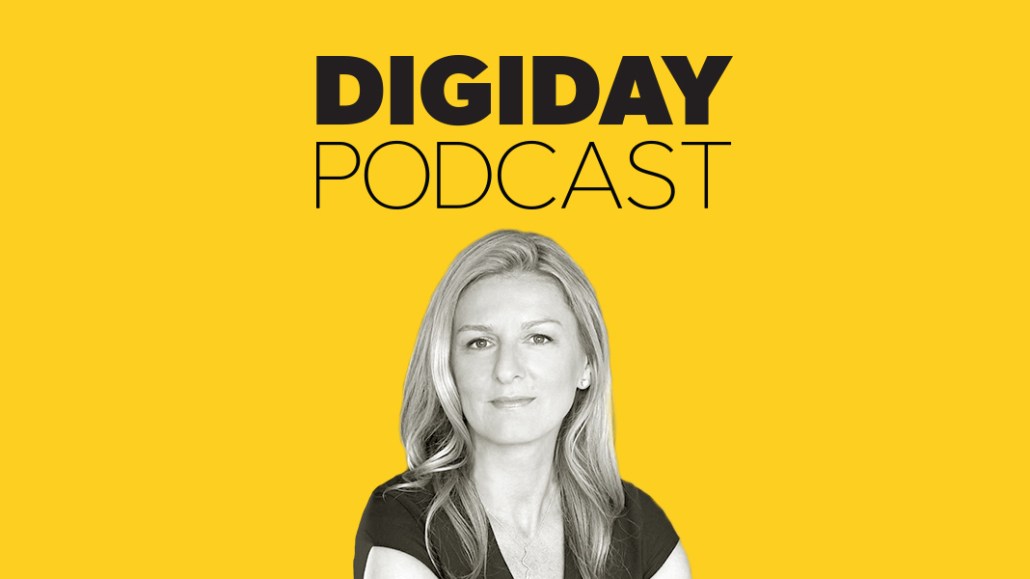Secure your place at the Digiday Media Buying Summit in Nashville, March 2-4
Guardian US CEO Evelyn Webster forecasts profit ‘even in the most dire scenario’

Subscribe: Apple Podcasts | Stitcher | Google Play | Spotify
The Guardian’s pivot to paid has a unique twist: There’s no paywall. Instead, The Guardian relies on reader contributions — a model gaining believers in news organizations caught between making their coronavirus coverage free of charge and facing ad shortfalls at the same time.
“There’s absolutely no doubt that we’re going to see a boost to our reader revenue during this period,” said Guardian U.S. and Australia CEO Evelyn Webster on this week’s episode of the Digiday Podcast. “We are going to see our advertising hit hard. I do not know how hard and how deep. I don’t think any of us do. [But] even in the most dire scenario that I have looked at, the Guardian would still be a profitable business in America. So are we well positioned to continue our journey to grow? Yes. And I feel very confident about that.”
Reader contributions from American readers at about 40-45% of the US operation’s income. Thanks to this evolving revenue scheme and a serious cost-cutting effort, in 2019 the Guardian as a whole made its first operating profit in 20 years.
The Guardian recorded its best month ever in terms of web traffic.
“There is absolutely no doubt that that is what’s driving the current trend,” Webster said in reference to the pandemic. “We hit 114 million browsers in March, and that was an increase [of] 80 to 90% on the prior month and about 160% on the prior year.”
Webster talked about the difference between British and American contributor behavior, why the U.S. can use the perspective of a British newspaper and how the Guardian’s ownership structure (it’s owned by a trust) keeps its coverage impartial.
Here are a few highlights from the conversation, which have been lightly edited for clarity.
Profit even in “the most dire scenario”
We have a very strong position in America. Our traffic, our engagement, our loyal and engaged readers have been growing slowly and steadily. There’s absolutely no doubt that we’re going to see a boost to our reader revenue during this period, and we are going to see our advertising hit hard. I do not know how hard and how deep. I don’t think any of us do. Even in the most dire scenario that I have looked at, the Guardian would still be a profitable business in America. So are we well positioned to continue our journey to grow? Yes. And I feel very confident about that.
Strong reader revenue, no paywall required
We hit upon this idea, quite bizarre — lots of people doubted whether it would be successful — but it was this theory that ‘look, if we have these deep connections with our readers across the globe, will there be enough of them in America and elsewhere in the world that they would underwrite our journalism even if they didn’t have to?’ And we believed that they would, and we’ve been proven right, which is why the business model that we have [is] voluntary contribution. Readers who come to the Guardian anywhere in the world will at some point in their user journey with us be confronted with a message — lots of different messages, lots of different ways, sizes, voices — that says ‘whilst you are here, would mind terribly making a contribution to our journalism?’ And our reader revenue model was born from that, and we’ve been doing that very successfully for the last three years.”
Riding highs and retaining readers
We experienced this in 2016 (in the last election) and with other major news moments, and we are experiencing it right now — we definitely see our traffic spike quite considerably, and we retain a significant proportion of that traffic. And that I think is the thing that really distinguishes the Guardian in terms of our strategic focus on developing meaningful reach. We’re not interested in eyeballs for the sake of eyeballs. We want those consumers and readers to keep on coming back.
This Friday, at noon ET, we are airing our next episode of The New Normal, a weekly interactive show focused on how publishers are adapting their businesses. This week, Action Network CEO Patrick Keane will talk with Digiday editor-in-chief Brian Morrissey about how a sports media company focused on sports betting adapts in an age where sports around the world are canceled. Register here.
More in Media

Media Briefing: Turning scraped content into paid assets — Amazon and Microsoft build AI marketplaces
Amazon plans an AI content marketplace to join Microsoft’s efforts and pay publishers — but it relies on AI com stop scraping for free.

Overheard at the Digiday AI Marketing Strategies event
Marketers, brands, and tech companies chat in-person at Digiday’s AI Marketing Strategies event about internal friction, how best to use AI tools, and more.

Digiday+ Research: Dow Jones, Business Insider and other publishers on AI-driven search
This report explores how publishers are navigating search as AI reshapes how people access information and how publishers monetize content.





